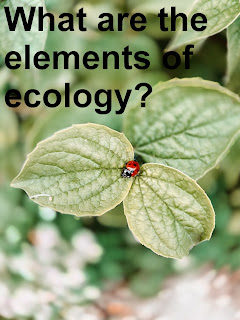Exploring the
Intricate Elements of Ecology: Understanding the Web of Life
Introduction :
Ecology the scientific study of the interactions between
organisms and their environment unravels the intricate web of life on our
planet. It provides us with a comprehensive understanding of how living
organisms and their surroundings shape and influence each other. At the heart
of ecology lie several key elements that shed light on the functioning and
dynamics of ecosystems. In this article we will embark on a journey to explore
these fundamental elements ranging from individual organisms to entire biomes
and understand how they interconnect to sustain life on Earth.
- Organism: The Building Blocks of
Life (200 words): At the core of ecology lies the study of individual
organisms be they plants animals or microorganisms. Organisms exhibit
unique physiological and behavioral adaptations that allow them to survive
and thrive in their specific environments. Ecologists delve into the
intricacies of these adaptations examining how organisms acquire energy
reproduce and interact with other species. Understanding the
characteristics and traits of organisms helps us grasp the foundations of
ecology. - Population: Uniting Species (250
words): Ecology extends beyond individual organisms to encompass populations
which comprise a group of individuals of the same species occupying a
specific area. Populations are dynamic entities influenced by factors such
as birth rates death rates and migration. Ecologists analyze population
dynamics to study changes in population size density and distribution.
They also explore genetic diversity within populations as it plays a
critical role in adaptation and evolution.
- Community: The Interplay of
Species (300 words): Communities emerge when populations of different
species coexist in a given area. Interactions within communities can take
various forms such as predation competition mutualism and commensalism.
Ecologists investigate the complex relationships between species studying
how they influence one another and shape community composition. By
understanding community dynamics we gain insight into the intricate
balance that allows multiple species to thrive in shared ecosystems. - Ecosystem: The Harmony of Life and
Environment (350 words): Ecosystems provide a holistic view of the
interactions between living organisms and their abiotic surroundings. An
ecosystem encompasses the biotic components (plants animals
microorganisms) and abiotic factors (soil water air climate) that form a
functional unit. Ecologists analyze the flow of energy nutrient cycling
and the intricate web of interactions within ecosystems. By deciphering
these processes we gain a deeper understanding of how ecosystems function
and how disturbances can impact their stability. - Habitat: Where Life Finds Its Home
(200 words): Habitats refer to the specific environments where organisms
or populations naturally reside. Ecologists study the characteristics of
habitats including physical conditions resources and structural features.
The concept of habitat is crucial for understanding species distribution
patterns and the adaptations required for survival in different
environments. By examining habitats ecologists gain insights into the
diverse niches occupied by organisms. - Niche: The Ecological Role (250
words): The ecological niche of a species encompasses its specific role
and position within an ecosystem. It involves how a species interacts with
other species and utilizes available resources. Ecologists investigate how
species partition resources to minimize competition and maximize
coexistence. Understanding niches helps us appreciate the complexity of
ecological communities and how species adapt to various ecological
conditions. - Biome: Earth's Ecological
Landscapes (300 words): Biomes represent large-scale ecological
communities characterized by distinct climate vegetation and animal life.
They include tropical rainforests deserts grasslands tundra and more.
Ecologists examine the distribution structure and functioning of biomes to
understand the adaptations of organisms within them. Each biome supports
unique communities of organisms playinga vital role in shaping the overall
biodiversity of our planet.
- Biodiversity: The Tapestry of Life
(350 words): Biodiversity refers to the variety and abundance of living
organisms in an ecosystem. It encompasses genetic diversity species
diversity and ecosystem diversity. Ecologists study biodiversity to
understand the intricate relationships between species the resilience of
ecosystems and the services they provide to humans. Biodiversity acts as a
measure of ecosystem health and plays a crucial role in maintaining
ecological balance. - Succession: A Journey of Change
(250 words): Ecological succession refers to the gradual change in species
composition and ecosystem structure over time. Primary succession occurs
in barren environments where life colonizes previously uninhabited areas
such as volcanic islands or newly formed land. Secondary succession occurs
after disturbances like fires or human activities. Understanding
succession provides insights into how ecosystems recover and develop
showcasing the resilience and adaptability of nature. - Conservation: Protecting Our
Natural Heritage (300 words): One of the key applications of ecology is in
conservation and environmental management. Ecologists assess the impact of
human activities on ecosystems develop strategies for sustainable resource
use and design protected areas to preserve biodiversity. Conservation
efforts rely on the knowledge of ecological processes to mitigate threats
restore degraded habitats and ensure the long-term survival of species and
ecosystems.
Conclusion:
Ecology unveils the
intricate elements that shape the living world around us. From the smallest
organisms to entire ecosystems each element plays a vital role in maintaining
the delicate balance of nature. By understanding the interconnections between
organisms populations communities and ecosystems ecologists provide insights
into the complexity and resilience of our planet's biodiversity. These insights
form the foundation for conservation efforts and sustainable management of our
natural resources.
As we navigate the challenges posed by a rapidly changing
world the study of ecology becomes increasingly relevant. It is through our
understanding of these ecological elements that we can make informed decisions
fostering a harmonious coexistence between humans and the environment. By
embracing the principles of ecology we can work towards a sustainable future
that preserves the beauty and diversity of our planet for generations to come.







.jpeg)


.jpg)
0 Comments